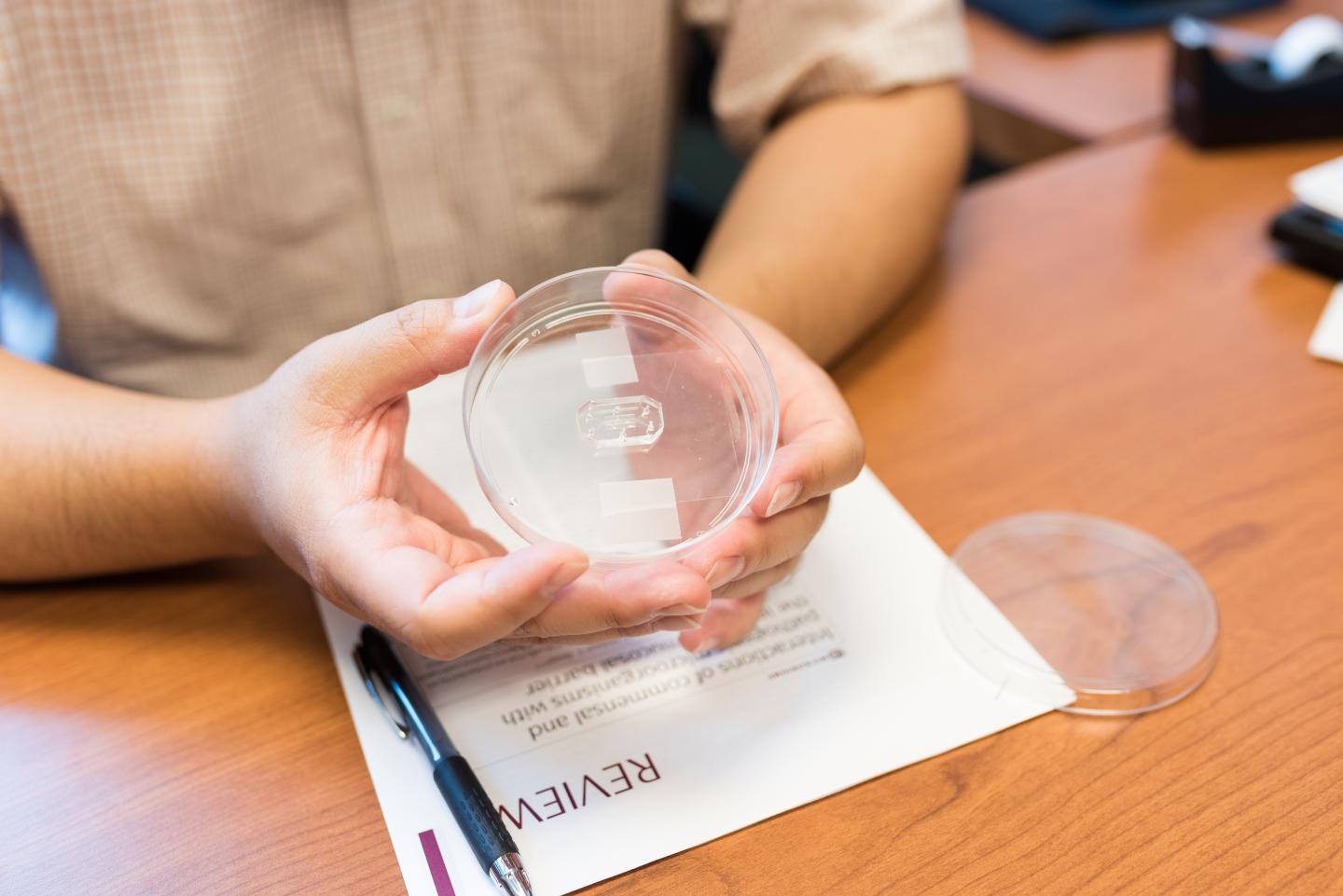Thanks to a new $1.8 million grant from The Helmsley Charitable Trust, UT Austin Engineer Hyun Jung Kim will apply his ‘Gut-On-A-Chip’ technology to better understand Crohn’s disease

Credit: Cockrell School of Engineering, The University of Texas at Austin
To model human health and disease, organ-on-a-chip technology mimics the human body’s organ structure, functionality and physiology in a controlled environment. These miniature systems, which serve as accurate models of various organs from the heart and lungs to the gut and the kidneys, can use a patient’s own cells to test drugs and understand disease processes to help determine the right treatment for the right patient.
For 10 years, Hyun Jung Kim, a biomedical engineering assistant professor in the Cockrell School of Engineering at The University of Texas at Austin and assistant professor in the Department of Oncology in UT’s Dell Medical School, has been developing organs-on-chips, specifically examining inflammatory bowel diseases and colorectal cancer. In 2018, Kim led the first study to determine how an intestinal disease develops using human organ-on-a-chip technology, confirming with his “gut inflammation-on-a-chip” system that intestinal barrier disruption is the upstream initiator of gut inflammation.
Now, thanks to a new $1.8 million grant from The Leona M. and Harry B. Helmsley Charitable Trust, Kim will apply his technology to better understand Crohn’s disease — an inflammatory bowel disease that can cause severe adnominal pain, diarrhea, fatigue and malnutrition. He and his research team will develop their Crohn’s disease-on-a-chip system to gain greater insight into what can cause and exacerbate the disease, with the goal of developing new treatments.
“I am humbled by the generosity of the Helmsley Charitable Trust,” Kim said. “I am also excited by the opportunity to help find answers to the root cause of a disease where much more research is needed.”
It is estimated that half of the 3 million Americans living with inflammatory bowel disease have Crohn’s disease. While the cause of the disease is currently unknown, doctors and researchers believe that genetic, immune and environmental factors contribute to disease onset and progression.
“Crohn’s disease is an extraordinarily complicated disease to figure out,” said Declan Fleming, M.D., an associate professor in the Department of Surgery and Perioperative Care at the Dell Medical School who will work with Kim on this project. “We believe this research can lead to a new tool to help us address the complexity of this disease. This could lead to improved treatments or possibly even to reverse the progression of Crohn’s disease altogether.”
Helmsley has made Crohn’s disease one of the top priorities in their focus on developing programs that improve life in the U.S. and around the world. With the number of people around the world affected by Crohn’s disease steadily rising, the organization sees an urgent need to prevent, diagnose early and reconcile the most effective and appropriate treatments for patients.
“There is a pressing need for more effective treatments for Crohn’s disease, and Helmsley is committed to finding more personalized options for patients,” said Garabet Yeretssian, director of Helmsley’s Crohn’s Disease Program. “This innovative ‘gut-on-a-chip’ technology has the potential to uncover triggers of Crohn’s disease, which will lead to improved therapies and ultimately better health outcomes.”
###
About the Helmsley Charitable Trust
The Leona M. and Harry B. Helmsley Charitable Trust aspires to improve lives by supporting exceptional efforts in the U.S. and around the world in health and select place-based initiatives. Since beginning its active grantmaking in 2008, Helmsley has committed more than $2 billion for a wide range of charitable purposes. Helmsley’s Crohn’s Disease Program supports impactful ideas and mobilizes a global community committed to improving the lives of Crohn’s disease patients while pursuing a cure.
Media Contact
John Holden
[email protected]
Original Source
https:/




